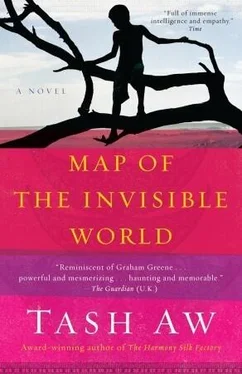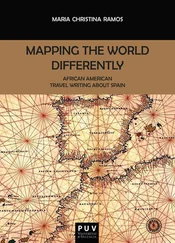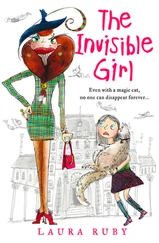Tash Aw - Map of the Invisible World
Здесь есть возможность читать онлайн «Tash Aw - Map of the Invisible World» — ознакомительный отрывок электронной книги совершенно бесплатно, а после прочтения отрывка купить полную версию. В некоторых случаях можно слушать аудио, скачать через торрент в формате fb2 и присутствует краткое содержание. Год выпуска: 2010, Издательство: Spiegel & Grau, Жанр: Современная проза, на английском языке. Описание произведения, (предисловие) а так же отзывы посетителей доступны на портале библиотеки ЛибКат.
- Название:Map of the Invisible World
- Автор:
- Издательство:Spiegel & Grau
- Жанр:
- Год:2010
- ISBN:нет данных
- Рейтинг книги:4 / 5. Голосов: 1
-
Избранное:Добавить в избранное
- Отзывы:
-
Ваша оценка:
- 80
- 1
- 2
- 3
- 4
- 5
Map of the Invisible World: краткое содержание, описание и аннотация
Предлагаем к чтению аннотацию, описание, краткое содержание или предисловие (зависит от того, что написал сам автор книги «Map of the Invisible World»). Если вы не нашли необходимую информацию о книге — напишите в комментариях, мы постараемся отыскать её.
comes an enthralling novel that evokes an exotic yet turbulent place and time—1960s Indonesia during President Sukarno’s drive to purge the country of its colonial past. A page-turning story,
follows the journeys of two brothers and an American woman who are indelibly marked by the past — and swept up in the tides of history.
Map of the Invisible World — читать онлайн ознакомительный отрывок
Ниже представлен текст книги, разбитый по страницам. Система сохранения места последней прочитанной страницы, позволяет с удобством читать онлайн бесплатно книгу «Map of the Invisible World», без необходимости каждый раз заново искать на чём Вы остановились. Поставьте закладку, и сможете в любой момент перейти на страницу, на которой закончили чтение.
Интервал:
Закладка:
Farah said, This is sick. I’m leaving now, Johan. Don’t care if you come or not. Onstage the woman was struggling with the python, her face contorting in an expression between pain and ecstasy as the snake’s thick coils tightened around her body. Johan did not know if she was pretending or if the pain was real. He eased his way through the crowd, through the messy chorus of whistles and clapping that accompanied every exaggerated motion onstage. He did not look back.
He found Farah standing by the car. She turned her head quickly when she saw him emerging out the door. She stared down the street, at the rows of streetlamps that lit this nighttime city.
Don’t be angry, he said, reaching out to hold her hand. It’s just a bit of fun. She had bunched her hand into a fist and he held the tightly knotted ball until he felt her fingers relax and loosen.
I hope no one’s seen us here, she said, still looking away. It would be so shameful if anyone did. Mummy and Daddy would die of shame.
Daddy’s probably in there somewhere, we just didn’t look hard enough.
She glared at him with narrowed eyes and he felt her hand tense once more, pulling away from him. What is the matter with you? You have such a good family and yet you are so angry all the time. Why? Just tell me: Why? I don’t know, I don’t know. He tried to reach out to her but she shrank away from him again. I’m sorry, Farah, it just feels that there’s nowhere for me to go. When I think of this life ahead of me I see so many empty years. Don’t look at me as if I’m crazy. You know what I mean. There’s nothing left for me, Farah. Sometimes I … sometimes I just want it all to end.
Nothing left for you? That makes me so angry. See how much Mummy loves you? She loves you more than she loves me and Bob put together, and yet you behave like some, some … I don’t know what. Okay, so you’re an orphan, so what? Think about what could have happened to you, what would have happened if you hadn’t come to us. You might be an urchin, or you might be dead…. God knows what happened to all those other orphans.
It was he who turned away this time. The streetlamps that lit the broad avenue before them were too bright, he thought. Cars flashed by, their headlights adding to the glare, bleaching the darkness from the night. He wished the city were darker, without any light at all.
Farah leaned against the car, looking away. He thought she was going to touch him but she did not. I’m sorry, she said. I didn’t mean to remind you of your brother.
He did not answer.
You know what Mummy says, Farah continued, we shouldn’t talk about it. But I want to know, Johan. Tell me about your brother, I want to understand. Oh, abang , don’t look so unhappy. What happened? Just tell me. You’ll feel better. Don’t cry. Don’t cry.
Johan began to speak but all of a sudden he felt like he was choking. It wasn’t my fault, he said. It wasn’t my fault. I didn’t know.
What wasn’t your fault, Johan? Please tell me.
But he could no longer speak. The memories were too thick.
She held him with both arms and drew him close to her. He could smell the faint traces of coconut oil in her hair.
17
A dam awoke with the sensation of not having slept at all. His ribs hurt where he had been trodden on in the riot, and every breath was an effort, exacerbating the dull pain on the right side of his torso that only abated if he held his breath. His sleep had consequently been disturbed and dreamless, and once or twice he woke with a start, believing, in the midnight darkness, that he was actually back at home, in his narrow, soft bed, and he expected to hear Karl’s footsteps in the other room, his bare feet padding on the linoleum, and then perhaps coming down the corridor to check that Adam was asleep. But the door did not open to let in that thin, comforting sliver of light; instead he found himself on the floor of Din’s room, shifting awkwardly on the rattan mat that they had unfurled on the concrete floor for him to sleep on. Din had snored throughout the night, the adrenaline finally having drained from his body midway through the evening, whereupon he simply collapsed onto his mat, drawing one pillow under his head and another to his belly, folding his body into a tight fetal position in which he remained for the rest of the night. Just minutes before, he had been sitting in a cross-legged position, arms flailing as usual as he spoke in vehement criticism of the death of Sukarno’s revolutionary ideals, riding the last waves of exhilaration from that afternoon’s riot. “We supported him, but he betrayed us,” he said, jabbing his finger at Adam as if the woes of Indonesia were his fault. “You heard his speech today — three hours of lies which we accept because we’re too poor and uneducated to think otherwise. We had three hundred years of suffering under the Dutch and now we think anything will be better, even this”—he jabbed his finger at Adam again. “So I ask you, is it better to be oppressed by a foreigner or by someone of your own race? Oh my god, you’re so stupid, you don’t understand what I’m saying. Let me put it another way: Is it better to suffer because of someone you hate or someone you love?” But even as he pointed accusingly at Adam once more, Adam noticed his eyelids had become thick and dark, and he was blinking to try and keep himself awake. “Is it?” he repeated in a half slur, and then sank slowly from his upright position onto the mat. It was like watching a rare, night-blooming flower, something florid and extravagant, that suddenly curled up and withdrew from the world at the height of its display; and all at once Adam was alone with nothing but that insistent ache in his ribs to keep him company through the long night. In the morning the pain was still there, as was Din’s final, niggling question, the answer to which Adam could not find: Is it better to suffer because of someone you hate or someone you love?
Adam drew himself into a sitting position, listening to the sounds of the unfamiliar neighborhood: crying babies, the hollow clanging of metal on metal, the sawing of wood, and, most of all, the curious absence of human voices. There was a sheet hanging over the window, screening the room from the fierce morning sun; the light fell on the floor in funny, swirly patterns — translucent sea creatures that wriggled, disappeared, and reappeared each time the sheet shifted. Adam listened for Din but could not hear him. He did not know what time Din had left; it must have been not long after dawn, just after Din had risen to observe Azan Suboh. Adam had stirred briefly from his sleep and seen Din rising and falling to his knees in seamless, graceful motions — weightless, like in a dream. He must have left soon afterward.
When he stood up, Adam was pleased to find that his ribs did not hurt quite as much. He ventured out into the corridor of the silent house. Din’s landlady sat in a rattan chair, fast asleep with her head thrown back and her mouth open, a thin trail of dried spittle tracing its way from the side of her mouth to her chin. A box of buttons lay next to her, and in her lap there was a small tray containing spools of thread. In the palms of her upturned hands there were a few buttons attached loosely to a length of thread. Adam peered down the corridor in search of a toilet but there was only another bedroom and a minuscule open kitchen, beyond which lay the narrow empty street in this agglomeration of houses that was neither a suburb nor a slum but something in between, something that wanted to be decent and clean but appeared squalid and threatening. His need to relieve himself became instantly more pressing as he realized there was no toilet; he would have to urinate in the street, into a canal, or onto a pile of rubbish as he had seen others do since his arrival in Jakarta. Just a few days ago he had been shocked by this lack of shame, by the dirtiness of the people of this city, but now he was learning that it was not a question of modesty but one of need. There were no bushes in this neighborhood, nothing he could use to hide, and so he too would have to debase himself in public.
Читать дальшеИнтервал:
Закладка:
Похожие книги на «Map of the Invisible World»
Представляем Вашему вниманию похожие книги на «Map of the Invisible World» списком для выбора. Мы отобрали схожую по названию и смыслу литературу в надежде предоставить читателям больше вариантов отыскать новые, интересные, ещё непрочитанные произведения.
Обсуждение, отзывы о книге «Map of the Invisible World» и просто собственные мнения читателей. Оставьте ваши комментарии, напишите, что Вы думаете о произведении, его смысле или главных героях. Укажите что конкретно понравилось, а что нет, и почему Вы так считаете.












